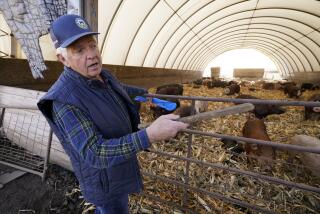Hog-slaughterhouse plan stirs controversy over how meat is made
- Share via
Reporting from Chicago — A giant slaughterhouse in the Illinois river town of East Moline is creating a big stink — and it hasn’t even been built yet.
Supporters of the proposed facility, which would process thousands of hogs a day, say it would bring jobs and economic revitalization to the Iowa border community. Mayor John Thodos says he thinks it will create 2,500 jobs in an area where unemployment has doubled in five years.
The controversy surrounding the project reflects an intensifying national debate over how we should house, raise, slaughter and process the livestock we consume.
Opponents say the Triumph Foods project would mean environmental damage, bad odors and lower property values. The plant would be close to the Rock River and wetlands, they note. “It’s a huge plant being built on a wetland and a flood plain that could end up flooding nearby homes,” said Jerry Neff, chairman of the local Sierra Club.
Critics also say the plant would encourage an influx of large hog farms that would contribute to environmental problems and wipe out smaller operations. The facility would “increase demand for food animals that will probably be met by factory farms in Illinois,” said Max Muller of Environment Illinois, a nonprofit advocacy group.
“We already have … all sorts of environmental problems from factory farms,” including manure spills into waterways and odor issues, Muller said. “Until we clean up regulation of factory farm pollution, we don’t want to be furthering demand for the products from them.”
The proposal by Triumph, a Missouri-based processor, has driven a wedge in the community for nearly five years. Though many issues are still pending, Triumph’s Pat Lilly has said construction on the plant could start in the spring.
Today, nearly 90% of all hogs are slaughtered in plants that each process more than 1 million animals a year, according to the American Meat Institute. And 81% of all U.S. hogs are raised in facilities that house more than 2,000. Family farms and small meat processors have perished in tandem over the last 30 years as the biggest companies bought up farms and consolidated operations.
Triumph officials did not agree to be interviewed, but the company has said it already has contracts with suppliers for hogs that will be raised in confinement specifically for that plant. Such integrated business arrangements bring cheap meat to the dinner table. But environmentalists, family farmers, food activists and some scientists believe that benefit comes at a high cost to the environment, America’s health, small farms and taxpayers.
The Justice Department and U.S. Department of Agriculture are conducting public meetings to discuss antitrust issues raised by these collaborations. The USDA also has proposed new rules aimed at leveling the playing field for independent farmers, but they are meeting resistance from the National Cattlemen’s Beef Assn. and National Pork Producers Assn., two large players in the industry.
These issues come together in the debate over the Triumph plant, billed in 2005 as a facility that would slaughter 16,000 hogs a day and bring in hundreds of jobs. But the company asked for millions in local tax breaks that required unanimous approval by five local city councils, and one council said no.
A few months later, however, then-Gov. Rod Blagojevich resuscitated the project with a state-funded economic package worth about $16 million. By 2007, Triumph had purchased 116 acres in East Moline on which to build.
Debates, petitions, public meetings and editorials raged in the community through late 2008, when Triumph put the project on hold, citing economic conditions. But the plan resurfaced in December 2009 with more powerful political friends and new sources of financial support.
Two Illinois Democrats, Sen. Dick Durbin and Rep. Phil Hare, announced they would endorse millions in loan guarantees from the USDA to get the plant built. East Moline also applied for a $4.8 million in economic development assistance from the U.S. Commerce Department for water and sewer construction near the plant site.
Triumph is still eligible for the state’s $16-million package, according to the Illinois Department of Commerce and Economic Opportunity, but the department declined to say whether it was in discussions with the company about the funds.
Dismayed by Triumph’s return, opponents of the plan recently regrouped in a church to share stories and strategize over grass-fed beef tacos. They hope that a last push against the slaughterhouse may slow the approval of federal and state aid — or at least prompt the government to produce an environmental impact statement before building begins.
A tall, tan former hog farmer named Art Norris decried what he described as the inhumane treatment of animals raised in confined-animal feeding operations, the staggering amount of feces created by hogs and the number of plants already discharging into the Rock River.
“Triumph already says that a lot of this meat will be going to Japan,” said Norris, named the Quad Cities’ “waterkeeper” by a national advocacy group aimed at protecting waterways from pollution. “So they get the meat, and we get the waste they leave behind.”
meng@tribune.com
More to Read
Sign up for Essential California
The most important California stories and recommendations in your inbox every morning.
You may occasionally receive promotional content from the Los Angeles Times.













